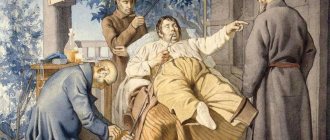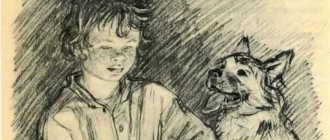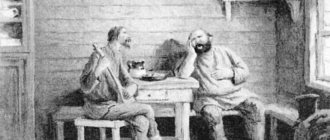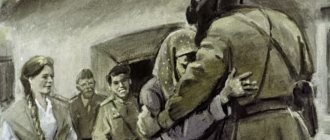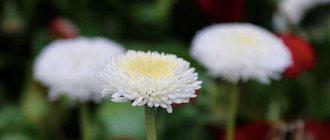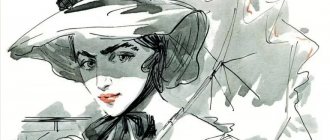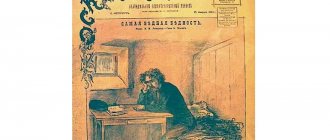Analysis of the story Turgenev's Date
The work is part of the writer’s prose collection entitled “Notes of a Hunter,” which considers human relationships in the form of fidelity and the depth of love feelings as the main theme.
The narration in the work is carried out by the narrator, who becomes an involuntary observer of the secret meeting of two young people, represented in the images of the main characters of the work, Victor and Akulina.
Akulina is portrayed by the writer as a timid, graceful girl of pretty appearance with thick white hair and thin eyebrows framed by long thick eyelashes and large light eyes. The girl is not a representative of the serf peasants, but has no education, is deprived of maternal care, having remained after the death of her mother with her father, towards whom she feels fear and timidity. Akulina’s outfit is distinguished by neatness and a certain elegance in the form of a clean white shirt, highlighting the nobility of her young skin, a checkered peasant skirt and large yellow beads decorating her neck. For a more vivid and accurate description of Akulina, the author uses a description of a bouquet of flowers, which is an important symbol of the story, consisting of field rowan, string, blue cornflowers, forget-me-nots, which are tied with a thin blade of grass.
Victor is introduced by the narrator as the spoiled valet of a wealthy landowner, copying his master in manners and clothing. The hero's appearance is depicted as unpleasant in the form of a ruddy, fresh, impudent face, distinguished by a narrow forehead and thick, curled hair. Victor's outfit is tasteless, pretending to be a lordly gloss, since the collar of the master's coat props up his ears, and the starched sleeves and bright rings focus attention on the ugliness of his crooked, red fingers.
The storyline of the story tells of a secret meeting in a forest clearing between Akulina and Victor, during which the young man notifies the girl, who clearly has a strong feeling for him, about his imminent departure. At the same time, Victor expresses cynical indifference to the experiences of Akulina, who feels crushed and insulted, leaving the girl crying on the grass all alone, without even deigning to say goodbye.
Analysis of the story by I. S. Turgenev “Date”
The story “Date” belongs to the cycle of stories “Notes of a Hunter”, written at different times, but united by themes, ideas, genre, style and character of the narrator. This story was first published in 1850 in the Sovremennik magazine.
Character system
The story has three characters: the girl Akulina, the footman Victor and the narrator.
Akulina. Portrait. This image constitutes the ideological and compositional center.
As a virtuoso painter, Turgenev presents the portrait of Akulina in detail, paying attention not only to the features
appearance, but resorting to a description of facial expressions, gestures and poses. The first mention of this image in the text is sculptural: the girl sits with her head down and her hands on her knees. This is a pose of deep thoughtfulness, from which one can guess about contradictory thoughts and at the same time humility - this is further confirmed by the text: the face is “simple and meek... and full of bewilderment in front of one’s own sadness.” The narrator is delighted with her, he fails to hide his admiration for the girl’s beauty behind slightly ironic characteristics: “she’s not very ugly”, “her head is very cute”, “even a little thick and round nose” - through these attempts to make the description objective, extraneous and even slightly The cynical reader sees admiring every feature of the girl. Every detail of clothing attracts attention to the hands, then to the neck, then to the waist.
An interesting contradictory detail: the hair is “blond” and at the same time “ash-colored.” They are combed in a peasant style - “diverging in two semicircles from under a narrow scarlet bandage.” The skin is thin, beautifully tanned.
Further mention is made of high eyebrows and long eyelashes, and the narrator’s imagination draws the girl’s eyes before he saw them. There is a thick bunch of wildflowers on Akulina’s lap, and a tear is rolling down her cheek. The result is a sentimental portrait of a “shepherdess,” but Turgenev goes further and creates not a decorative, but a detailed, lyrical, psychologized image. It is no coincidence that the narrator carefully monitors his eyes and body movements, because gestures, glances and facial expressions can tell the observer what he cannot hear from afar when Akulina and Victor are talking. And, of course, this is the only way the hunter can judge the thoughts and moods of the heroine.
At first, the eyes “quickly flashed” - the girl was disturbed by a sound. This conveys anxiety. The eyes were “large, bright and timid, like a doe’s.” A timid and graceful girl is compared with a doe.
The next movement is characteristic of a doe girl: “she perked up,” then “straightened up and became timid; the gaze trembled.” From this description it is obvious that the girl is expecting a meeting, that she is afraid of this meeting, but passionately desires it. This contradiction is further confirmed when Victor appears: she “flushed up, smiled joyfully, happily - and immediately sank all over, turned pale, embarrassed.” The gaze takes on an unexpectedly new color: it becomes “almost pleading.” And further admiration is manifested in her attitude towards Victor: Akulina greedily catches his every word and timidly kisses his hand, and in her gaze there is “so much tender devotion, reverent submission and love.”
Akulina is also picturesque in her expression of grief. At the same time, there is nothing ostentatious or false in it. The girl tries to restrain herself, but a feeling of aching melancholy and hopelessness fills every movement: “her whole body was convulsively worried.”
At the end, the image of a doe appears again: when the hunter appeared, “where did the strength come from - she rose with a weak cry and disappeared behind the trees.”
The name Akulina is traditional for a girl from the common people. However, Turgenev does not dare to make his heroine a purebred serf peasant: “not quite a peasant; and your mother wasn’t always a peasant either,” says Victor. But she did not receive an education.
Her mother died, lived with her father, was afraid of her relatives, namely, she was afraid of being forced into an unwanted marriage.
Cloth . A simple peasant costume looks neat and even elegant on a girl. This is a clean white shirt, highlighting the noble color of the skin, and a plaid skirt. The only decoration is large yellow beads.
Bouquet. This is a very important symbol for the entire work, “a dense bunch of wildflowers.” The text indicates which flowers make up the bouquet: field ash, string, forget-me-nots, mother's-eye and, separately, “a small bunch of blue cornflowers tied with a thin blade of grass.” It is characteristic that each element of the bouquet has its own meaning for Akulina: string - a remedy for scrofula, field ash - for calves, cornflowers - for Victor. If we consider the color scheme, then variegated yellow, white, purple flowers serve as a frame for larger dark cornflowers, carefully prepared in advance for a loved one, rejected by him and selected and kept by the narrator.
In an allegorical sense, these are all the best feelings and thoughts dedicated by the girl to her chosen one, also scolded, but striking a casual eyewitness and sketched by him on the pages of his notes.
Victor. If Akulina’s appearance in the story is sculptural, then Victor’s arrival is described in dynamics. First, “something rustled through the forest,” then “the figure of a man flashed.” The text immediately notes that this guy does not make a pleasant impression. Such a sculpture would turn out ugly.
This is “the spoiled valet of a young, rich master.” In clothes and, probably, in habits, he tries to copy his master. If Akulina’s modest clothing emphasizes the dignity of a beautiful young woman, then Victor’s attempts to add gloss to his costume only expose unpleasant features: collars prop up the ears, starched sleeves and especially gold and silver rings draw attention to ugly red crooked fingers.
The eyes are tiny, milky gray, and instead of a mustache there are disgusting yellow hairs on the thick upper lip. The face is ruddy, fresh, impudent, with a very narrow forehead. He is dressed in a coat from a master's shoulder, he has a pink tie and a cap with gold braid - “with pretentious taste,” however, judging by the cruel irony of the narrator, it is completely tasteless.
The valet's manners are rude, cheeky, and his behavior shows a dull complacency. Victor “breaks unbearably,” that is, he tries to give himself an important and independent appearance. To do this, he squints, frowns, plucks his antennae, and so on.
The manner of speech corresponds to facial expressions. The character pronounces the words casually, somewhat nasally, and even pronounces one line “as if from the stomach”; while constantly yawning and stretching. In addition to the fact that Victor carefully takes care of his appearance like a woman, his narcissism also creeps into his gestures.
He lovingly strokes himself on the head, lies down in front of Akulina, “lounging like a sultan,” and satisfied, satiated pride looks through his indifference on his face.
Victor is burdened by the conversation about his relationship with Akulina. He gets nervous and switches the topic to the bouquet in Akulina’s hands. These carefully collected flowers become only a momentary object of attention for the person for whom they are prepared, and then the cornflowers are carelessly thrown onto the grass.
To confirm his superiority, Victor carries with him peculiar fittings: these are the same watch on a chain and a lorgnette, which he still fails to put on. Probably. He connects these subjects with the concepts of “community” and “education.” But Akulina doesn’t understand all this, or rather, Victor himself has nothing to tell about it.
When breaking up, “breaking” also occurs. Victor tries to get up and leave several times, enjoying the fact that Akulina is holding him. For all his feigned self-confidence, the sight of tears dismays Victor, and he shamefully retreats, leaving the sobbing girl alone in the clearing.
Hunter. This is the third character in the story. In the story, he is the narrator, a witness to the events, and at the same time a judge of what is being described, giving an assessment and partially drawing conclusions.
Since the Hunter is a cross-cutting character in the entire cycle of stories, and his image is revealed gradually throughout the book, he should not be analyzed in detail within the framework of a single story. Suffice it to say that he is an observant, witty, critically thinking person, a landowner by social status; Not only is he passionate about hunting, but he appreciates and knows nature and, most importantly, is interested in the lives of the people he meets. Among these people are landowners and peasants; The hunter tries to pay attention to the character of everyone, regardless of class, but taking into account the living conditions of his heroes.
The authority of the Hunter's judgment is a prerequisite for reading the Notes. This means that in order to correctly understand the story, it is necessary to take the point of view of the narrator. This should be taken into account when discussing the problems of the work.
In addition, Hunter and Akulina carry out another pair of characters that make up another, side storyline.
Plot.
The plot of the story is that the narrator, while hunting, witnesses a meeting between Victor and Akulina in the forest. Victor announces his imminent departure with the young gentleman from the village. The girl feels unnecessary to her loved one, humiliated and lonely. The cruel young man is cynically indifferent to her suffering. He leaves without saying goodbye, leaving the sobbing Akulina lying face down on the grass.
The appearance of the Hunter scared the girl. She quickly disappears into the thicket, leaving a bouquet of cornflowers in the clearing. The hunter carefully selects flowers and stores them.
The plot of the story “Date” is built according to the classical scheme: exposition, beginning, development of events, climax, denouement and epilogue. The exposition of the story invites the reader to experience the magnificent autumn landscapes of central Russia. Against the backdrop of nature, in a forest clearing, the beginning of the main storyline takes place - a meeting in spirit between the main characters.
As the conversation develops, the history of their relationship becomes clear, and a conflict situation arises.
The inevitability of separation due to Victor's departure served as an impetus for the discovery of a deep conflict: one of the heroes does not, and did not previously, attach much importance to their relationship, while for the other this is their whole life; the girl completely relies on her lover, devotes herself entirely to him and probably has hopes. She doesn't allow herself to doubt that this is just as important to him. And when the obvious indifference of the young man can no longer be hidden from herself, the girl humbly asks for one thing - understanding, however, the limited and narcissistic lackey is not capable of this either.
The climax is when two characters cannot stand to be near each other. Emotional tension reaches its highest point, and the heroes part. This storyline has an open ending, events are interrupted at the climax.
But the plot of the story does not end there.
Another side storyline is the relationship between the narrator and the girl. Strictly speaking, these relationships are more imaginary on the part of the author. The characters do not know each other and have not spoken to each other. Their meeting was accidental, and only the narrator watched the girl for any long time, but she rushed headlong away, barely seeing his blurry silhouette through her tears. However, this meeting had a great impression on the hunter, he thought about her and remembered the girl several years later.
The hunter sympathizes so much with the heroine of his story that he takes upon himself what Akulina expected from Victor - understanding and compassion. This symbolizes the bouquet that the Hunter keeps, while the flowers are intended for Victor. In terms of the duration of events, this storyline exceeds the first: here the plot occurs when the narrator saw the girl, that is, before the main plot; the climax moment is when the girl sees the Hunter for the only moment in her life, gets scared of him and runs away.
At the time of the story, that is, several years later, the imaginary connection between the narrator and the girl continues to be preserved in the form of a dry bouquet of cornflowers, which the narrator carefully preserves.
Artistic details.
A bouquet is a very significant artistic detail. Wildflowers have no value for Victor, but Akulina knows the use of each of the herbs; she, having taste and a sense of aesthetics, sees the beauty and charm of simple flowers. The bouquet was collected carefully, with love - and rejected.
Also, Akulina’s feelings - all the best that she treasured in her soul - were offered to her lover and rejected by him. Functionally, this detail connects two storylines. And a short epilogue is dedicated to the bouquet: “...and her cornflowers, long withered, are still kept by me.”
The next artistic detail - Lornet - is an attribute of Victor, another character unsympathetic to the narrator. In the setting of a natural interior, the life of ordinary people, this item stands out as inappropriate and useless. Also, his owner, the footman, is dissonant with the situation with his appearance, manners and useless role in life.
By the way, in the exposition sketch it is said that the Hunter is accompanied by a Dog, but in the future she behaves very delicately, without betraying her presence in any way and allowing us to witness the events described without interference, so that by the middle of the action we can completely forget about her presence.
Landscape description. Turgenev is a recognized master of landscape. The action of this story, like many other stories in the cycle, takes place in the interior of nature.
In this work, the description of nature echoes the plot as an allegory.
The season - autumn - traditionally symbolizes the final phase in literature. In the context of the plot, this is the end of the relationship between the two main characters. Also, the mood of autumn - decline, sadness, anxiety - corresponds to the mood of the events described in the story. The changeable weather - now rain, now a cloud, now glimpses of the sun - seems to repeat the play of moods on the face of the main protagonist.
The contrast between the aspen and birch groves corresponds to the contrast between the characters of the main characters. The narrator's sympathy for the girl's character is projected onto the preference given to the birch tree, admiring this tree. At the same time, dislike for Victor is reflected in his attitude towards aspen: the narrator does not like aspen, but admits that it can be good at other times, just as men like Victor “unfortunately, women very often like it.”
The narrative ends with a landscape sketch. Now, through the gloomy smile of nature, the sad fear of the near winter peeks through - the future does not bode well for the heroine of the story. The wind blows fallen leaves along the road - so life scatters the heroes of the story in different directions, and they will never meet again.
In the same tone of light sadness and nostalgia, the epilogue is written, ending with an ellipsis.
The verbal organization of the text corresponds to the genre of the story. The narrator's monologue is interspersed with dialogues; deviations from the plot express the author's attitude towards what is being described. In direct speech, the characteristics of the speaker are preserved, determining social affiliation and occupation. Akulina’s speech is smooth, euphonious, full of epithets, but at the same time simple and quite literate.
She corresponds to the image of a “shepherdess,” a somewhat idealized peasant woman.
Victor's speech reveals his belonging to the gentry. There is a touch of artificiality in it: slightly awkward syntax, abruptness, redundant introductory words, and the presence of stylistically inappropriate vocabulary, which is also distorted.
The narrator speaks in the first person. By the colorful descriptions of nature, one can distinguish an inveterate hunter, and the apt characteristics of the characters and the selection of artistic details reveal an observant and experienced psychologist. The speech is distinguished by its artistry and richness of vocabulary.
Topics and problems.
As can be seen from the analysis of the plot, the object of the story is the denouement of the love relationship of two internally different people, their different understanding of the situation. The main motive is eternal human relationships, loyalty and frivolity, depth of feelings and superficiality.
The problematic is determined by the author's attitude to what is being described. One of the important elements of the story’s problems is the contrast between peasant farmers and servants. According to the conviction of the narrator, who is also the spokesman for the author’s opinion, the first are the bearers of primordial folk spirituality, purity and morality. Others are spoiled people, cut off from their roots, who have borrowed all the worst qualities from their master landowners and boast about it. This theme is also heard in other stories in the series.
The social conflict of these two classes was reflected in this story in the personal conflict of two heroes - a peasant woman and a servant.
The problems raised in the work were in many ways relevant only for the last century. A modern person, when reading this story, immerses himself in the everyday and social realities of that time, admires the color of nature, reflects on the eternal issues of relationships between people and recognizes himself in the characters described by Turgenev.
Several interesting essays
The play "The Thunderstorm" is one of Ostrovsky's most famous works. The images shown in this drama are very vivid and sometimes contradictory. But, showing the contrast of the heroes, the author sometimes reflects their similarity
The choice of life path is the main problem raised by the author in the work and revealed through the example of two heroes in the person of the colonel and Ivan Vasilyevich
There is no doubt that music is an integral part of our lives. Amazing and bewitching, she penetrates into the quietest and most secret corners of the human soul
Every person has dreams, regardless of his age. But, unfortunately, not all dreams come true. Well, of course, if a person dreams of having a pony, then such a dream can be left in a fairy tale.
Books play an important role in the development of any personality; even now in the era of information technology they are the main source of knowledge. By reading books, we learn new worlds and the unknown depths of the human soul.
Source
Works.Ru
The series of living miniatures of serf life created in “Notes of a Hunter”, of course, would not have given literature subtle, soft, full of classical simplicity and true real truth of essays of the small nobility, peasant people and inimitable landscapes of Russian nature, if the author had not been imbued with love for native soil of his fields, forests and did not retain in his soul the image of the suffering of the people inhabiting them! In “Notes of a Hunter” the images of men are striking. Charming, poetic images of peasants are contrasted in “Notes of a Hunter” with images of soul owners - people who are deeply immoral, mentally limited, and cruel. We are convinced of the spiritual superiority of the enslaved people over their enslavers. And this emphasizes the monstrosity of serfdom. Drawing images of landowners and their henchmen, the author of “Notes of a Hunter” turns into a satirist.
In “Notes of a Hunter” there are no scenes of torture, but it is the familiar everyday pictures of serf life that testify to the anti-human essence of the entire social system.
In "Date" the author depicted the last meeting of two young people. The meeting takes place in the forest. At the same time, an involuntary witness to this meeting is there. He falls asleep in the forest, but when he opens his eyes, he sees, twenty steps away, a young peasant girl who sits with her eyes downcast and both hands dropped on her knees. She was apparently waiting for someone, slowly sorting through the flowers, her eyelids turned red and a new tear rolled from under her thick eyelashes, stopping and sparkling radiantly on her cheek. Suddenly she started: the figure of a man flashed through the thicket. As soon as he saw the girl, he began to break down, he gave her a quick and indifferent glance, put his hands in his coat pockets, and sank to the ground.
The very behavior of this person shows his self-confidence. He shakes his leg and yawns. His words: “And I completely forgot. Moreover, look, it’s raining!” - show his bad manners. He comes to say that he is leaving. And when the girl starts crying, he says he will leave.
Akulina gives him flowers, Victor lazily reaches out his hand, takes it, casually sniffs the flower and begins to twirl it in his hands. Not a single kind word in his conversation! He doesn’t know what to say to Akulina, what to answer. It seems that talking to her is beyond his dignity. And when she asks to wait at least a little, Victor replies: “Wait for what? After all, I already said goodbye to you.” Sudden, chest-wrenching sobs do not allow Akulina to finish her speech - she collapsed on the grass and cried bitterly. The grief that had been suppressed for a long time finally poured out like a lotus. Victor stood over her, shrugged his shoulders, turned and walked away with long steps.
The main characters in this story are Akulina and Victor. Akulina is a young peasant girl. She is not very bad-looking. Thick blond hair, white as ivory forehead. Thin high eyebrows, long eyelashes. Victor is a spoiled valet. The face is ruddy, fresh, impudent. Very often women like such faces. He constantly squints his already tiny milky-gray eyes, frowns, lowers the corners of his lips, and yawns forcibly.
Turgenev describes nature very beautifully. He shows her mood: “through the gloomy, although fresh, smile of fading nature, the sad fear of the near winter seemed to creep in.”
The story “Date,” it seems to me, is one of the most lyrical, deeply poetic in the “Notes of a Hunter” cycle. The author managed to create a truly beautiful image of a young peasant girl. Perhaps it was this character that later served as the basis for a whole gallery of female images in Russian literature.
Plot plot
She was sitting on a tree stump and was clearly waiting for someone. A sweet girl with ashy blond hair was neatly dressed, and yellow beads adorned her neck. She had flowers on her lap, which she was sorting through, and she listened carefully to the rustling in the forest. The girl's eyelashes were wet from tears. Sadness and bewilderment were visible on her meek face. Branches crackled in the distance, then footsteps were heard, and a dapper young man came out into the clearing.
This is how the summary of Turgenev’s “Date” continues. By the appearance of the man, you can immediately determine that this is the master’s valet. He is wearing clothes from a lord's shoulder, his crooked red fingers are studded with gold and silver rings with turquoise. The girl peers at him, ugly and narcissistic, with delight and affection. From further conversation it turns out that they see each other for the last time. Akulina, that’s the heroine’s name, wants to cry, but Victor says that he can’t stand tears, and the poor thing holds them back as best she can.
She tilts her head towards the flowers, carefully sorts them out and tells the young man what each flower means, and gives him a bouquet of cornflowers. He casually drops it and talks about imminent separation: his master is leaving for St. Petersburg, and then, possibly, abroad.
